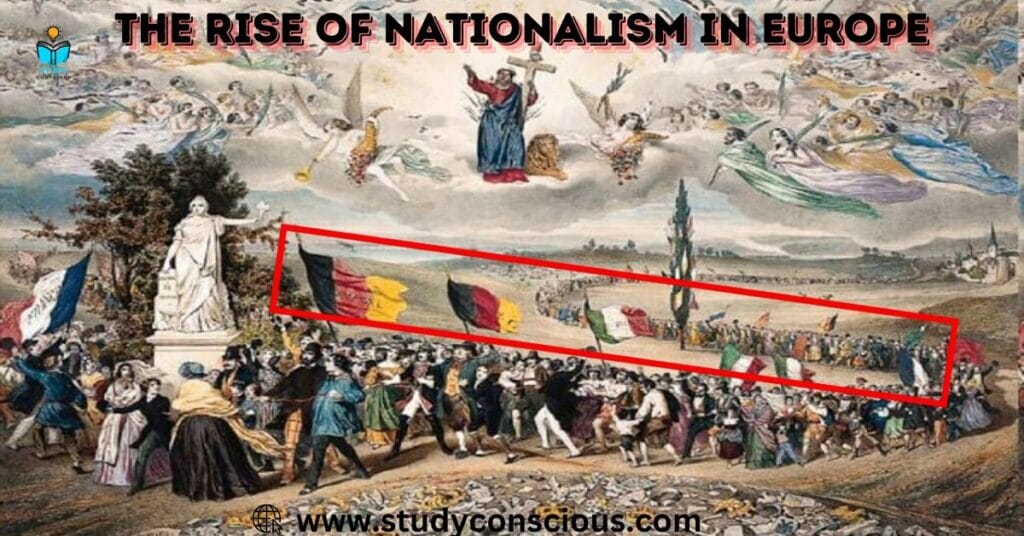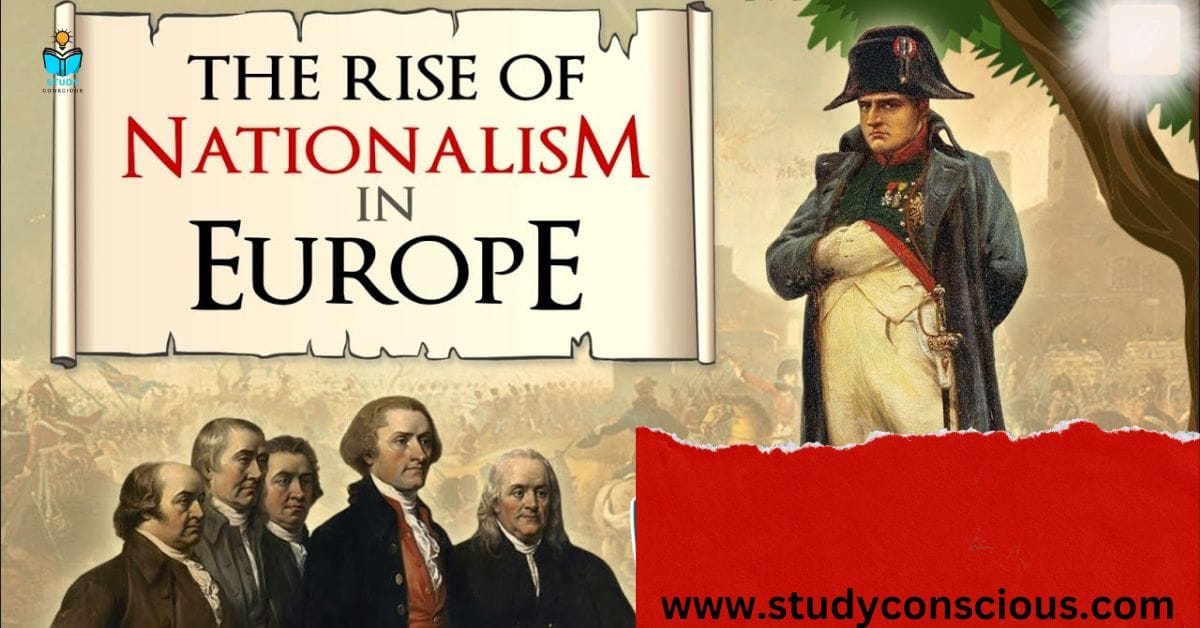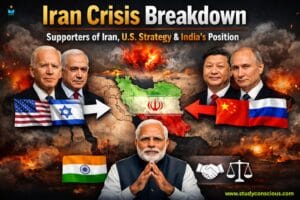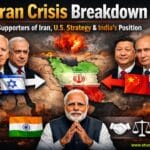The rise of nationalism in Europe is a significant historical phenomenon that transformed the continent during the 19th and early 20th centuries. Nationalism, the belief that people who share a common language, culture, and history should constitute an independent nation, emerged as a powerful force that reshaped borders and societies. Here are key factors and events that contributed to the rise of nationalism in Europe:
यूरोप में राष्ट्रवाद का उदय एक महत्वपूर्ण ऐतिहासिक घटना है जिसने 19वीं और 20वीं सदी की शुरुआत में पूरे महाद्वीप को बदल दिया। राष्ट्रवाद, यह विश्वास कि एक समान भाषा, संस्कृति और इतिहास साझा करने वाले लोगों को एक स्वतंत्र राष्ट्र का गठन करना चाहिए, एक शक्तिशाली शक्ति के रूप में उभरा जिसने सीमाओं और समाजों को नया रूप दिया। यहाँ यूरोप में राष्ट्रवाद के उदय में योगदान देने वाले प्रमुख कारक और घटनाएँ दी गई हैं:

1. The French Revolution and Napoleonic Wars (1789-1815) || फ्रांसीसी क्रांति और नेपोलियन युद्ध (1789-1815)
- French Revolution: The revolution promoted ideas of liberty, equality, and fraternity, challenging the old monarchical order and inspiring nationalist sentiments.
- Napoleon Bonaparte: His conquests spread these revolutionary ideas across Europe. Though Napoleon imposed French control, the exposure to nationalist ideas led to a backlash and the growth of nationalist movements.
- फ्रांसीसी क्रांति: इस क्रांति ने स्वतंत्रता, समानता और बंधुत्व के विचारों को बढ़ावा दिया, पुरानी राजशाही व्यवस्था को चुनौती दी और राष्ट्रवादी भावनाओं को प्रेरित किया।
- नेपोलियन बोनापार्ट: उनकी विजयों ने इन क्रांतिकारी विचारों को पूरे यूरोप में फैलाया। हालाँकि नेपोलियन ने फ्रांसीसी नियंत्रण लगाया, लेकिन राष्ट्रवादी विचारों के संपर्क में आने से प्रतिक्रिया हुई और राष्ट्रवादी आंदोलनों का विकास हुआ।
2. The Congress of Vienna (1814-1815) || वियना कांग्रेस (1814-1815)
- After the defeat of Napoleon, European powers convened to restore the old order and redraw the continent’s map.
- The Congress ignored nationalist aspirations, restoring monarchies and creating multi-ethnic empires. This disregard for national identities sowed the seeds of future nationalist movements.
- नेपोलियन की हार के बाद, यूरोपीय शक्तियों ने पुरानी व्यवस्था को बहाल करने और महाद्वीप के नक्शे को फिर से बनाने के लिए बैठक की।
- कांग्रेस ने राष्ट्रवादी आकांक्षाओं को नज़रअंदाज़ किया, राजशाही को बहाल किया और बहु-जातीय साम्राज्यों का निर्माण किया। राष्ट्रीय पहचान के प्रति इस उपेक्षा ने भविष्य के राष्ट्रवादी आंदोलनों के बीज बोए।
3. Romanticism (Late 18th – Early 19th Century) || रोमांटिकतावाद (18वीं सदी के अंत से 19वीं सदी के प्रारंभ तक)
- Romanticism was an artistic and intellectual movement that emphasized the importance of national identity, culture, folklore, and history.
- Writers, poets, and artists like Johann Gottfried Herder and Giuseppe Verdi inspired national pride and unity through their works.
- रोमांटिकवाद एक कलात्मक और बौद्धिक आंदोलन था जिसने राष्ट्रीय पहचान, संस्कृति, लोककथा और इतिहास के महत्व पर जोर दिया।
- जोहान गॉटफ्रीड हेरडर और ग्यूसेप वर्डी जैसे लेखकों, कवियों और कलाकारों ने अपने कामों के माध्यम से राष्ट्रीय गौरव और एकता को प्रेरित किया।
4. Revolutions of 1848 || 1848 की क्रांतियाँ
- A series of interconnected revolutionary movements erupted across Europe, driven by demands for national independence, democracy, and social reform.
- Though most were suppressed, these revolutions demonstrated widespread nationalist aspirations and set the stage for future nation-building.
- राष्ट्रीय स्वतंत्रता, लोकतंत्र और सामाजिक सुधार की मांगों से प्रेरित होकर यूरोप भर में परस्पर जुड़े क्रांतिकारी आंदोलनों की एक श्रृंखला शुरू हुई।
- हालाँकि अधिकांश को दबा दिया गया, लेकिन इन क्रांतियों ने व्यापक राष्ट्रवादी आकांक्षाओं को प्रदर्शित किया और भविष्य के राष्ट्र-निर्माण के लिए मंच तैयार किया।
5. Unification Movements || एकीकरण आंदोलन
- Italy: Leaders like Giuseppe Garibaldi, Count Camillo di Cavour, and the Kingdom of Piedmont-Sardinia played crucial roles in unifying various Italian states into a single nation by 1870.
- Germany: Otto von Bismarck, the Prussian Chancellor, used diplomacy and wars to unite the German states under Prussian leadership, culminating in the formation of the German Empire in 1871.
- इटली: ग्यूसेप गैरीबाल्डी, काउंट कैमिलो डि कैवूर और पाइडमोंट-सार्डिनिया साम्राज्य जैसे नेताओं ने 1870 तक विभिन्न इतालवी राज्यों को एक राष्ट्र में एकीकृत करने में महत्वपूर्ण भूमिका निभाई।
- जर्मनी: प्रशिया के चांसलर ओटो वॉन बिस्मार्क ने प्रशिया के नेतृत्व में जर्मन राज्यों को एकजुट करने के लिए कूटनीति और युद्ध का इस्तेमाल किया, जिसकी परिणति 1871 में जर्मन साम्राज्य के गठन में हुई।
6. Decline of Multi-Ethnic Empires || बहुजातीय साम्राज्यों का पतन
- The Austro-Hungarian, Ottoman, and Russian Empires struggled to control diverse ethnic groups seeking independence or greater autonomy.
- Nationalist movements within these empires gained strength, leading to internal conflicts and eventual dissolution or significant territorial losses in the early 20th century.
- ऑस्ट्रो-हंगेरियन, ओटोमन और रूसी साम्राज्यों ने स्वतंत्रता या अधिक स्वायत्तता चाहने वाले विविध जातीय समूहों को नियंत्रित करने के लिए संघर्ष किया।
- इन साम्राज्यों के भीतर राष्ट्रवादी आंदोलनों ने ताकत हासिल की, जिसके कारण 20वीं सदी की शुरुआत में आंतरिक संघर्ष और अंततः विघटन या महत्वपूर्ण क्षेत्रीय नुकसान हुआ।
7. World War I (1914-1918) || प्रथम विश्व युद्ध (1914-1918)
- The war intensified nationalist sentiments as nations mobilized their populations for the war effort.
- The Treaty of Versailles and other post-war treaties redrew national boundaries, creating new nation-states based on ethnic lines and further promoting nationalism.
- युद्ध ने राष्ट्रवादी भावनाओं को तीव्र कर दिया क्योंकि राष्ट्रों ने युद्ध के प्रयास के लिए अपनी आबादी को संगठित किया।
- वर्साय की संधि और युद्ध के बाद की अन्य संधियों ने राष्ट्रीय सीमाओं को फिर से परिभाषित किया, जातीय आधार पर नए राष्ट्र-राज्यों का निर्माण किया और राष्ट्रवाद को और बढ़ावा दिया।
8. Cultural and Economic Factors || सांस्कृतिक और आर्थिक कारक
- The rise of print culture, education, and literacy spread nationalist ideas widely.
- Industrialization and economic changes created a sense of shared identity and common interests among people within the same nation.
- मुद्रण संस्कृति, शिक्षा और साक्षरता के उदय ने राष्ट्रवादी विचारों को व्यापक रूप से फैलाया।
- औद्योगीकरण और आर्थिक परिवर्तनों ने एक ही राष्ट्र के लोगों के बीच साझा पहचान और समान हितों की भावना पैदा की।
Impact of Nationalism || राष्ट्रवाद का प्रभाव
- Positive Aspects: Led to the unification of countries, the development of national cultures, and the promotion of self-determination.
- Negative Aspects: This also resulted in ethnic conflicts, and aggressive expansionism, and contributed to the causes of both World Wars.
- सकारात्मक पहलू: देशों के एकीकरण, राष्ट्रीय संस्कृतियों के विकास और आत्मनिर्णय को बढ़ावा मिला।
- नकारात्मक पहलू: इसके परिणामस्वरूप जातीय संघर्ष और आक्रामक विस्तारवाद भी हुआ और इसने दोनों विश्व युद्धों के कारणों में योगदान दिया।
Conclusion || निष्कर्ष
The rise of nationalism in Europe was a complex and multifaceted process, influenced by intellectual movements, political events, and socio-economic changes. While it led to the creation of nation-states and the fostering of national identities, it also brought about significant conflict and upheaval, reshaping the European continent in profound ways.
यूरोप में राष्ट्रवाद का उदय एक जटिल और बहुआयामी प्रक्रिया थी, जो बौद्धिक आंदोलनों, राजनीतिक घटनाओं और सामाजिक-आर्थिक परिवर्तनों से प्रभावित थी। जबकि इसने राष्ट्र-राज्यों के निर्माण और राष्ट्रीय पहचान को बढ़ावा दिया, इसने महत्वपूर्ण संघर्ष और उथल-पुथल भी लाई, जिसने यूरोपीय महाद्वीप को गहन तरीकों से नया रूप दिया।











